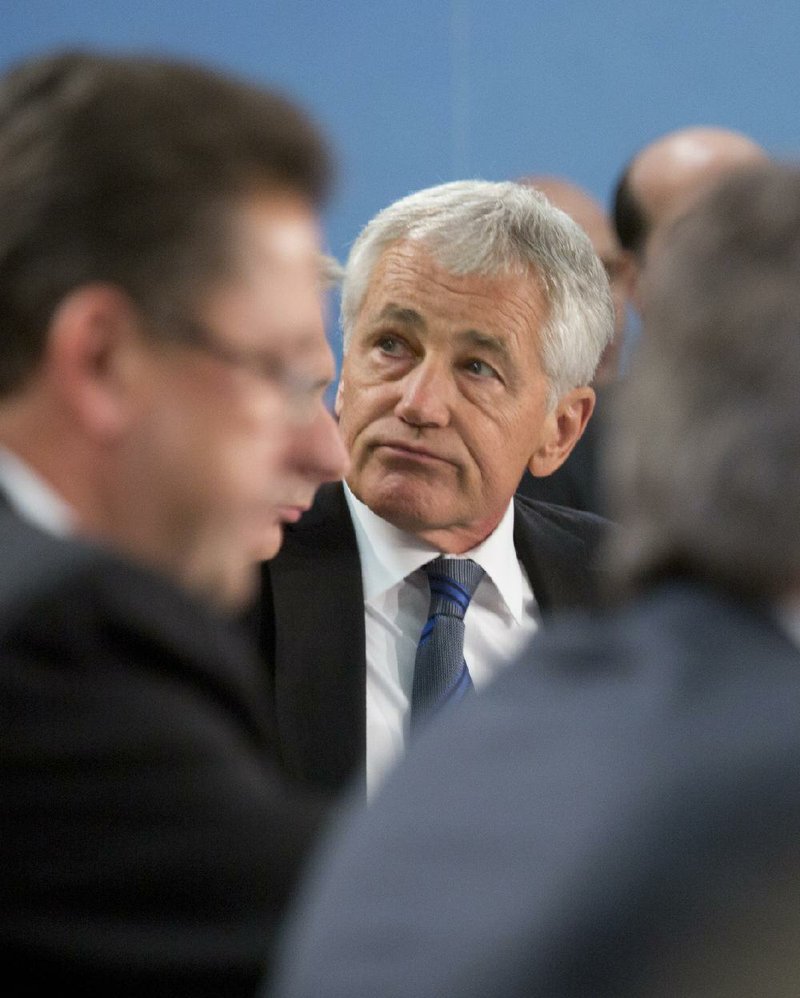BRUSSELS - U.S. and Afghanistan officials said Tuesday that they are confident tribal elders and the Afghan population will agree to keep U.S. and coalition troops in the country after 2014, even as a senior U.S. military official warned of high-profile attacks and assassinations leading up to Afghanistan’s presidential elections next year.
A senior U.S. official said Afghan Defense Minister Bismillah Mohammadi told U.S. Defense Secretary Chuck Hagel that he has strong confidence that the agreement would be endorsed soon and that the vast majority of Afghans support it. The two spoke during a NATO meeting where leaders were getting updates on the war and progress of the Afghan forces.
In a separate discussion, a senior U.S. military official said he is pretty confident that the agreement will be signed, adding that he has spoken to Afghans at every level and none has said the bilateral security agreement was a bad idea.
The military official also said Afghans recognize that keeping U.S. and coalition troops in the country after 2014 to train and assist the Afghan forces is key to getting the more than $4 billion in financial support that allied nations have pledged to provide.
The officials spoke on condition of anonymity because they were not authorized to discuss the issues publicly because of NATO rules.
U.S. Secretary of State John Kerry and Afghan President Hamid Karzai reached an agreement about a week ago on the key elements of a deal that would allow American troops to stay after 2014, when combat troops are scheduled to leave. One key unresolved issue - which is a deal breaker for the U.S. - is whether U.S. military courts maintain legal jurisdiction over the troops.
The U.S. official said Hagel made it clear to Mohammadi that jurisdiction is a must for the security agreement.
Karzai said that issue must be discussed by the consultative assembly of tribal elders, or loya jirga, before he makes a decision.
The national meeting is expected to start between Nov. 19 and 21 and could last as long as a week, with as many as 3,000 people attending. The loya jirga is not binding, but Karzai is likely to follow it. The agreement would then have to be ratified by the Afghan Parliament.
U.S. officials have said the U.S. and NATO would like to keep between 8,000-12,000 troops in Afghanistan to train and assist the Afghan force and conduct counterterrorism operations against al-Qaida. If the security agreement is not signed, all troops would leave at the end of next year.
Meanwhile, the U.S. military official warned Tuesday that on the basis of intelligence reports and discussions with Afghans, the U.S. is expecting the Taliban to try to disrupt April’s elections with high-profile attacks and targeted killings aimed at candidates and high-level officials.
The military official said that although the peak fighting season is ending, he expects a concerted effort by the enemy to try and prevent successful elections. The Afghan security forces are preparing for that fighting campaign now, he said.
On Tuesday, the top contenders for the 2014 presidential elections all survived a preliminary disqualification round that eliminated 16 minor candidates for not meeting requirements, officials said.
Independent Elections Commission chief Ahmad Yousuf Nuristani said the disqualified candidates have 20 days to raise any objections to the commission. He added that 10 of the 26 candidates who registered by the Oct. 6 deadline made the cut.
Most of the eliminated candidates were barred because of improper documents and other violations, including dual nationalities and lack of university degrees.
Karzai is not entitled to run for a third consecutive term in elections but is expected to back at least one of the candidates - his former foreign minister, Zalmai Rassoul, despite the fact that his businessman brother Qayyum Karzai also is running for president. Both men qualified for the vote.
Other top contenders who remain in the running include another former foreign minister, Abdullah Abdullah, who was the runner-up to Karzai in the 2009 elections and dropped out just ahead of a runoff vote after allegations of fraud in the first round.
Another is Ashraf Ghani, a Pashtun former finance minister who oversaw the transition of security from foreign forces to the Afghan army and police. Ghani ran and lost in the 2009 elections.
Two former Afghan warlords who are sharing a ticket, one for president, the other for vice president, also qualified. They are Abdul Rab Rasoul Sayyaf, an influential lawmaker and religious scholar, who is running for president along with former energy and water minister Ismail Khan.
Rahim Wardak, a longtime defense minister, also made the cut.
Information for this article was contributed by Rahim Faiez and Patrick Quinn of The Associated Press.
Front Section, Pages 6 on 10/23/2013

